Refine search
Actions for selected content:
32 results
5 - Surveillance and Human Flourishing
- from Part I - Conceptualizing the Digital Human
-
-
- Book:
- Being Human in the Digital World
- Published online:
- 11 November 2025
- Print publication:
- 20 November 2025, pp 63-76
-
- Chapter
-
- You have access
- Open access
- HTML
- Export citation
Law, more-than-human agency, and audiovisual storytelling: de-centering Western research ethics through working-class scholar-activism and embodied rituality
-
- Journal:
- International Journal of Law in Context , First View
- Published online by Cambridge University Press:
- 11 November 2025, pp. 1-21
-
- Article
-
- You have access
- Open access
- HTML
- Export citation
Organized Carelessness: De-ethicizing the Organization of Death
-
- Journal:
- Business Ethics Quarterly , First View
- Published online by Cambridge University Press:
- 25 September 2025, pp. 1-31
-
- Article
-
- You have access
- Open access
- HTML
- Export citation
Opening the black box of the municipal government: exploring the lived experiences of local public servants with citizen participation and decentralisation in The Netherlands
-
- Journal:
- Journal of Social Policy , First View
- Published online by Cambridge University Press:
- 20 August 2025, pp. 1-17
-
- Article
-
- You have access
- Open access
- HTML
- Export citation
Multispecies Organizing in the Web of Life: Ethico-Political Dynamics of Matters of Care in Ecologies-in-Place
-
- Journal:
- Business Ethics Quarterly , First View
- Published online by Cambridge University Press:
- 19 May 2025, pp. 1-30
-
- Article
-
- You have access
- Open access
- HTML
- Export citation
Business continuity, bureaucratic resilience and the limitations of neoliberal survival logics in international organisations
-
- Journal:
- Review of International Studies , First View
- Published online by Cambridge University Press:
- 14 October 2024, pp. 1-22
-
- Article
-
- You have access
- Open access
- HTML
- Export citation
Thinking with Forests as Sentient Societies: Towards a Pedagogy and Ethic of Immanent Care
-
- Journal:
- Australian Journal of Environmental Education / Volume 40 / Issue 2 / April 2024
- Published online by Cambridge University Press:
- 26 September 2024, pp. 258-275
-
- Article
-
- You have access
- Open access
- HTML
- Export citation
Maternalism. Care and control in diplomatic engagements with civil society
-
- Journal:
- Review of International Studies / Volume 51 / Issue 3 / May 2025
- Published online by Cambridge University Press:
- 22 March 2024, pp. 545-565
- Print publication:
- May 2025
-
- Article
-
- You have access
- Open access
- HTML
- Export citation
Chapter 20 - Literature as a Form of Care?
- from Part III - Applications: Politics
-
-
- Book:
- Literature and Medicine
- Published online:
- 17 January 2024
- Print publication:
- 18 January 2024, pp 345-356
-
- Chapter
- Export citation
10 - Conclusion
-
- Book:
- Caring for Cultural Heritage
- Published online:
- 09 November 2023
- Print publication:
- 23 November 2023, pp 360-363
-
- Chapter
- Export citation
2 - Caring for Cultural Heritage
-
- Book:
- Caring for Cultural Heritage
- Published online:
- 09 November 2023
- Print publication:
- 23 November 2023, pp 32-55
-
- Chapter
- Export citation

Compassion-Justice Conflicts and Christian Ethics
-
- Published online:
- 19 October 2023
- Print publication:
- 02 November 2023
A Reply to Clark Wolf, Elizabeth Edenberg, and Helga Varden
-
- Journal:
- Dialogue: Canadian Philosophical Review / Revue canadienne de philosophie / Volume 62 / Issue 2 / August 2023
- Published online by Cambridge University Press:
- 13 October 2023, pp. 261-277
-
- Article
-
- You have access
- Open access
- HTML
- Export citation
22 - Care
- from Part IV - Intimate and Everyday Life
-
-
- Book:
- The Cambridge Handbook for the Anthropology of Ethics
- Published online:
- 11 May 2023
- Print publication:
- 25 May 2023, pp 561-590
-
- Chapter
- Export citation
A Pharmacological Perspective on Technology-Induced Organised Immaturity: The Care-giving Role of the Arts
-
- Journal:
- Business Ethics Quarterly / Volume 33 / Issue 3 / July 2023
- Published online by Cambridge University Press:
- 16 March 2023, pp. 565-595
- Print publication:
- July 2023
-
- Article
-
- You have access
- Open access
- HTML
- Export citation
2 - Approaches to ethical lawyering
-
- Book:
- Parker and Evans's Inside Lawyers' Ethics
- Published online:
- 05 January 2023
- Print publication:
- 10 January 2023, pp 27-56
-
- Chapter
- Export citation
6 - Ethical challenges in civil dispute resolution
-
- Book:
- Parker and Evans's Inside Lawyers' Ethics
- Published online:
- 05 January 2023
- Print publication:
- 10 January 2023, pp 168-209
-
- Chapter
- Export citation

Parker and Evans's Inside Lawyers' Ethics
-
- Published online:
- 05 January 2023
- Print publication:
- 10 January 2023
-
- Textbook
- Export citation
4 - A Disability Rights–Informed Ethics of Care
- from Part I - Care Policy Tensions
-
- Book:
- Care and Support Rights After Neoliberalism
- Published online:
- 21 April 2022
- Print publication:
- 28 April 2022, pp 80-94
-
- Chapter
- Export citation
5 - A New Framework for Designing Rights-Based Care and Support Policy
- from Part II - Balancing Competing Claims through Rights-Based Policy and Law
-
- Book:
- Care and Support Rights After Neoliberalism
- Published online:
- 21 April 2022
- Print publication:
- 28 April 2022, pp 97-136
-
- Chapter
- Export citation
